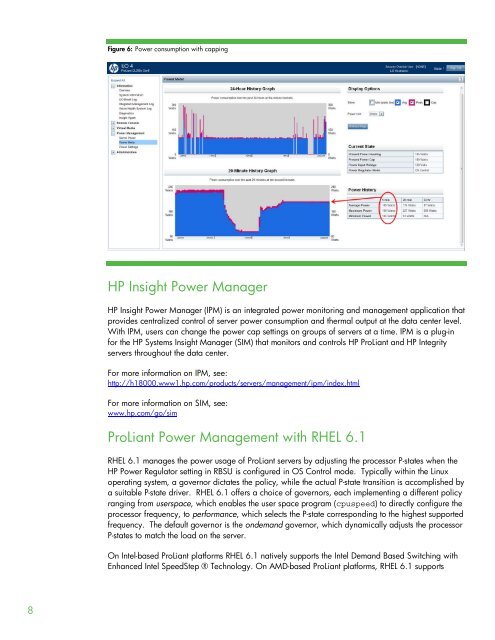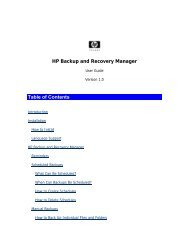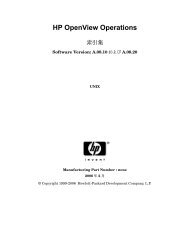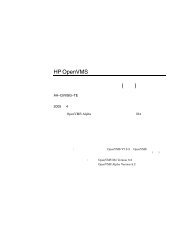HP ProLiant Server Power Management - Hewlett Packard
HP ProLiant Server Power Management - Hewlett Packard
HP ProLiant Server Power Management - Hewlett Packard
Create successful ePaper yourself
Turn your PDF publications into a flip-book with our unique Google optimized e-Paper software.
8<br />
Figure 6: <strong>Power</strong> consumption with capping<br />
<strong>HP</strong> Insight <strong>Power</strong> Manager<br />
<strong>HP</strong> Insight <strong>Power</strong> Manager (IPM) is an integrated power monitoring and management application that<br />
provides centralized control of server power consumption and thermal output at the data center level.<br />
With IPM, users can change the power cap settings on groups of servers at a time. IPM is a plug-in<br />
for the <strong>HP</strong> Systems Insight Manager (SIM) that monitors and controls <strong>HP</strong> <strong>ProLiant</strong> and <strong>HP</strong> Integrity<br />
servers throughout the data center.<br />
For more information on IPM, see:<br />
http://h18000.www1.hp.com/products/servers/management/ipm/index.html<br />
For more information on SIM, see:<br />
www.hp.com/go/sim<br />
<strong>ProLiant</strong> <strong>Power</strong> <strong>Management</strong> with RHEL 6.1<br />
RHEL 6.1 manages the power usage of <strong>ProLiant</strong> servers by adjusting the processor P-states when the<br />
<strong>HP</strong> <strong>Power</strong> Regulator setting in RBSU is configured in OS Control mode. Typically within the Linux<br />
operating system, a governor dictates the policy, while the actual P-state transition is accomplished by<br />
a suitable P-state driver. RHEL 6.1 offers a choice of governors, each implementing a different policy<br />
ranging from userspace, which enables the user space program (cpuspeed) to directly configure the<br />
processor frequency, to performance, which selects the P-state corresponding to the highest supported<br />
frequency. The default governor is the ondemand governor, which dynamically adjusts the processor<br />
P-states to match the load on the server.<br />
On Intel-based <strong>ProLiant</strong> platforms RHEL 6.1 natively supports the Intel Demand Based Switching with<br />
Enhanced Intel SpeedStep ® Technology. On AMD-based <strong>ProLiant</strong> platforms, RHEL 6.1 supports
















